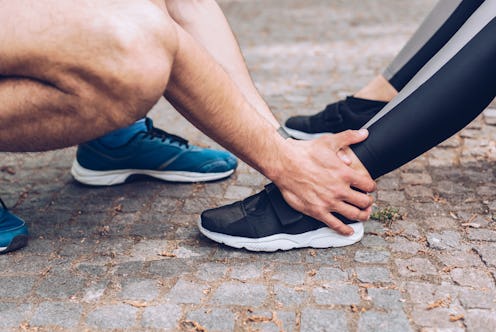
Getting cramp is the absolute worst; trust me, I get it a lot (particularly when pointing my toes and in water, strangely enough). And while cramp isn't season specific, some people find that their cramp becomes worse during the warmer months. So if you're wondering, "why do I get cramps more often during summer?" keep reading to discover more, and to find out how best to prevent and treat muscle cramps.
A cramp happens (most often in legs) when "a muscle suddenly shortens and becomes tight," according to the NHS. Whether it's during a workout or when you wake up in the middle of the night in bed, they can be seriously uncomfortable and often painful. And as mentioned, it may be the case that you experience them far more often during the summer. So why is this?
Well, it seems it has a direct connection to the heat.
"Heat cramps are painful muscle spasms that occur in the arms, legs, chest and abdomen, usually after several hours of exertion in heat," explains Ilona Major, Body Expert at Gazelli House. "They are thought to be caused by a deficiency in electrolytes that are known as various essential minerals such as sodium, potassium, calcium, and magnesium."
Sarah Elliott, founder of Vault Coaching and instructor at spinning haven Psycle, also explains that dehydration is at the core of cramp causes: "Cramping is due to dehydration so obviously in the summer, we lose water more through the natural rise in temperature. We are also more active generally in summer, so our body needs more water to sustain that."
Although these cramps can be irritating and sometimes even painful, luckily there are solutions and ways to prevent getting them. And unsurprisingly, this revolves around water intake and hydration, hydration, hydration.
"To prevent these heat cramps it is recommended to hydrate well prior to and during activities, especially if you have to stay in a hot and humid environment," says Major. "Heat induced muscle spasms usually resolve without any medical treatment."
Major continues:
"To treat heat cramps, it is recommended to stop the activity being performed, rest in a cool place, and drink replacement fluids such as electrolyte or sport drinks. You can also gently stretch the muscles that are cramping."
Elliott also recommends upping your intake of things like potassium, which can be found in supplements as well as fruits such as the humble banana.
Sodium deficiencies are however tougher to target easily, largely due to the relationship between salt and hydration levels.
"With sodium, you need to be careful upping salt intake as that can also increase dehydration," says Elliott. "Check in with your GP if you think it's a sodium deficiency for further advice."
Essentially, as well as making your skin amazing, keeping organs functioning well and being healthy, and making you feel ready to take on the day, water is also crucial for preventing and treating cramps, especially in the summer time.
I'm just off to refill my water bottle. Time to drink up!